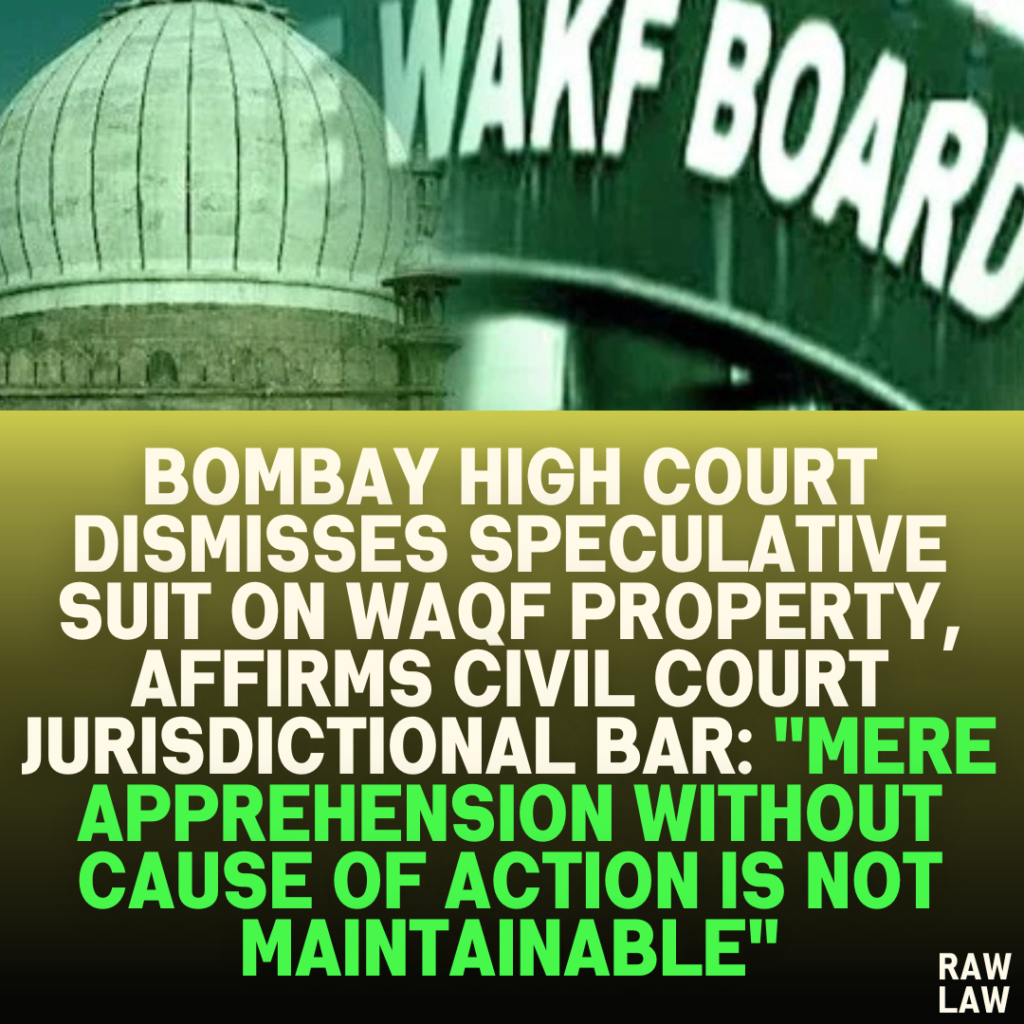Court’s Decision
The Bombay High Court quashed the Trial Court’s order, rejecting the application filed under Order VII, Rule 11 of the CPC, and dismissed the special civil suit. The court held that the suit lacked a valid cause of action and that disputes related to Waqf properties fall under the jurisdiction of the Waqf Tribunal as per Sections 83 and 85 of the Waqf Act, 1995.
Facts
The applicant, a Waqf Trust registered under the Maharashtra Public Trusts Act, 1950, owns properties, including Survey Nos. 58 and 60 in Thane, which are designated as Waqf properties. The plaintiffs purchased land adjacent to these properties, with access provided through the Waqf land. The plaintiffs had been using this easement for ingress and egress for 32 years without interference. However, they filed a suit seeking a declaration of this right after noticing obstructions placed by the Trust. The Trust responded by filing for rejection of the suit, arguing that the civil court lacked jurisdiction under the Waqf Act.
Issues
- Whether the Civil Court has jurisdiction to adjudicate disputes involving access to Waqf property.
- Whether a suit based on the plaintiff’s apprehensions without substantive cause of action is maintainable.
Petitioner’s Arguments
The petitioner, representing the Waqf Trust, contended that the civil court’s jurisdiction was barred under Sections 83 and 85 of the Waqf Act, as the Tribunal has exclusive authority over Waqf property disputes. They argued that the plaintiffs’ claim was based on mere apprehensions, lacking concrete cause, and cited various Supreme Court judgments to support the Waqf Tribunal’s jurisdiction over disputes involving Waqf properties.
Respondent’s Arguments
The respondents argued that the Trust’s actions obstructed their easementary right, crucial for accessing their agricultural land. They maintained that the Waqf Tribunal’s jurisdiction did not extend to matters concerning easement rights and that the civil court could adjudicate such matters.
Analysis of the Law
The court examined the scope of the Waqf Tribunal’s jurisdiction, noting that it is empowered to resolve all disputes concerning Waqf properties. Under Section 83, the Tribunal is deemed a civil court, handling disputes regarding Waqf property rights, barring civil courts from intervening in these matters.
Precedent Analysis
The court referenced several Supreme Court rulings establishing that the Waqf Tribunal holds exclusive jurisdiction in Waqf property disputes, including rights and obligations between parties involving Waqf assets.
Court’s Reasoning
The court found that the plaintiffs’ case was based solely on apprehensions of obstruction without substantial cause of action. It underscored that no concrete steps had been taken by the Trust to interfere with the plaintiffs’ easementary right. The court concluded that the suit was speculative, as the Trust had only requested a survey of its property, which did not amount to an obstruction or infringement on the plaintiffs’ right.
Conclusion
The court allowed the Trust’s application under Order VII, Rule 11, rejecting the plaintiffs’ suit and quashing the Trial Court’s order. It permitted the refund of the court fee and clarified that the plaintiffs could seek relief through appropriate forums if any future interference occurred.
Implications
The ruling reinforces that civil courts lack jurisdiction over Waqf property disputes, emphasizing that plaintiffs must present a valid cause of action rather than merely anticipated interference. This decision affirms that the Waqf Tribunal remains the sole authority for resolving such disputes.




Pingback: Delhi High Court Quashes Reassessment Notices Under Section 148 of the Income Tax Act, Citing Lack of Fresh Evidence and Insufficient Grounds in Cases Involving Foreign Investment Allegedly Serving as Conduit for Indian Investments - Raw Law
Pingback: Delhi High Court Affirms Tenant Bound to Voluntary Rent Increase Agreement, Restores Rent Controller's Order for Arrears Payment, Rejects Tenant's Attempt to Retract Under Delhi Rent Control (DRC) Act Provisions - Raw Law